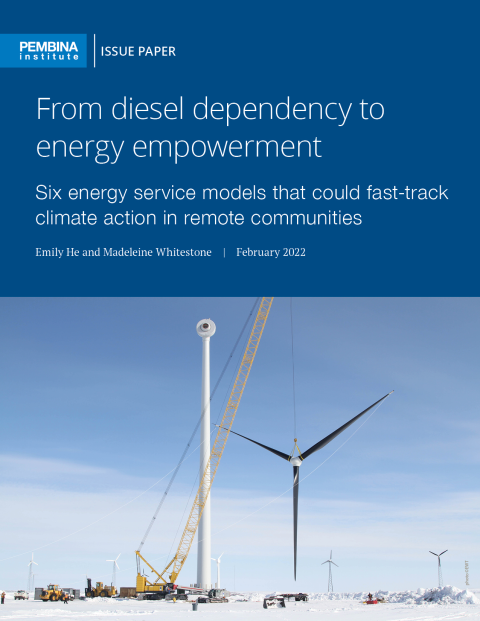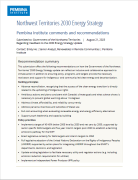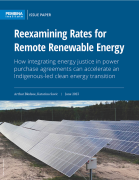This is the seventh publication in Climate and energy policy advancements: Eliminating diesel in Canada’s remote communities, a series providing insights, details, and analysis of each of the specific policies we are advocating for under our Renewables in Remote Communities (RiRC) program and the Indigenous Off-diesel Initiative (IODI).
In remote communities across Canada, energy efficiency programs and renewable energy projects are increasing in number and uptake. While the advancement of clean energy in places that remain heavily reliant on diesel-generated power is encouraging, systemic barriers remain and continue to prevent clean energy projects from moving ahead. Insufficient capacity, gaps in expertise, and the high cost of upfront capital investments combine to slow Indigenous-led energy projects from developing at the pace and scale needed to transition away from diesel.
Energy service models, or ESMs, offer options for clean energy proponents to develop, build, and operate projects by alleviating some of the challenges associated with lack of capacity and capital. While the ESMs operating in other jurisdictions can be operational in remote communities, new energy policies will need to be in place to enable Indigenous entrepreneurs to access them.
In this issue paper, six ESMs are presented that have been successfully implemented in jurisdictions outside of Canada’s remote communities. If applied within the setting of remote communities, these ESMs would support an accelerated adoption of clean energy projects. ESMs could be a means of empowering remote communities by facilitating their collective ownership and autonomy over community energy systems.
Key recommendations
- Initiate and implement tailored regulatory frameworks and policies to incentivize entry into the clean energy market.
- Governments and/or financial institutions need to offer grants and low-interest loans, which are essential to overcoming a lack of start-up capital; financial opportunities must be easily accessible for Indigenous applicants.
- The energy rates offered to energy providers must increase and be more attractive than the cost of subsidized diesel energy to create a strong business case for clean energy and energy efficiency programs, incentivizing Indigenous businesses to enter the market.
- Market entry should be facilitated through regulations that streamline the approval and connection of new and independently owned renewable energy systems.

Climate and energy policy advancements
Eliminating diesel in Canada’s remote communities
Publications in this series:
- Rethinking energy policy in Canada’s remote communities
- How to boost renewable energy integration in remote communities
- What’s a fair and equitable price for renewable energy in remote communities?
- Better government policies will unlock the cash remote Indigenous communities need for clean energy
- Reducing emissions from diesel generators in remote communities
- When business-as-usual is a barrier to clean energy
- From diesel dependency to energy empowerment
- Three clean energy options that could help replace diesel
- Remote communities transitioning to clean energy need better housing
- How remote communities should be included in the push to electrify transportation
- Government action on UNDRIP and the clean energy transition









